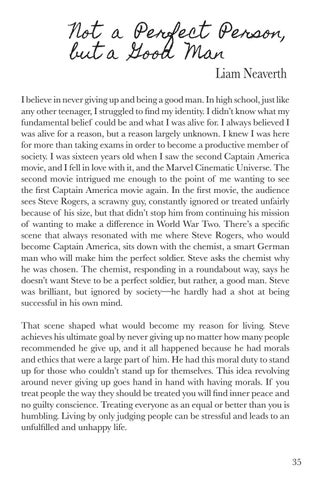Not a Perfect Person, but a Good Man Liam Neaverth
I believe in never giving up and being a good man. In high school, just like any other teenager, I struggled to find my identity. I didn’t know what my fundamental belief could be and what I was alive for. I always believed I was alive for a reason, but a reason largely unknown. I knew I was here for more than taking exams in order to become a productive member of society. I was sixteen years old when I saw the second Captain America movie, and I fell in love with it, and the Marvel Cinematic Universe. The second movie intrigued me enough to the point of me wanting to see the first Captain America movie again. In the first movie, the audience sees Steve Rogers, a scrawny guy, constantly ignored or treated unfairly because of his size, but that didn’t stop him from continuing his mission of wanting to make a difference in World War Two. There’s a specific scene that always resonated with me where Steve Rogers, who would become Captain America, sits down with the chemist, a smart German man who will make him the perfect soldier. Steve asks the chemist why he was chosen. The chemist, responding in a roundabout way, says he doesn’t want Steve to be a perfect soldier, but rather, a good man. Steve was brilliant, but ignored by society—he hardly had a shot at being successful in his own mind. That scene shaped what would become my reason for living. Steve achieves his ultimate goal by never giving up no matter how many people recommended he give up, and it all happened because he had morals and ethics that were a large part of him. He had this moral duty to stand up for those who couldn’t stand up for themselves. This idea revolving around never giving up goes hand in hand with having morals. If you treat people the way they should be treated you will find inner peace and no guilty conscience. Treating everyone as an equal or better than you is humbling. Living by only judging people can be stressful and leads to an unfulfilled and unhappy life. 35


